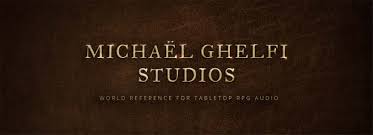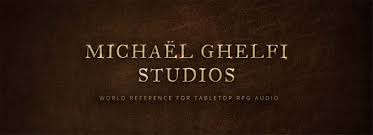Greetings Forge community, and welcome to the twenty-first edition of our Stars of the VTT Galaxy series. This regular interview series is meant to shine a light on the already bright stars that make up our community of Bazaar Creators.
In the ever-evolving world of TTRPGs, sound has become an essential tool for enhancing immersion and elevating storytelling. Few creators have had as much impact on this burgeoning space as Michael Ghelfi Studios, the first dedicated TTRPG audio label. Founded by Michael Ghelfi, alongside talented collaborators Filip Melvan and Lyre RPG Music, this passionate team has created one of the most comprehensive and immersive TTRPG audio libraries in the world. With the ENNIE Award under their belt, over 1,400 ambiances, 1,100 songs, and thousands of SFX, they’ve redefined the way GMs and players experience the rich worlds of their favorite RPGs.
We are honored to present our interview with Michael Ghelfi as we dive into the creative process, challenges, and future ambitions of Michael Ghelfi Studios. We explore how they craft their immersive audio, the importance of community feedback, and their vision for the future of sound in the TTRPG industry. Whether you’re a seasoned GM or a new player, Michael Ghelfi Studios’ work is sure to inspire and elevate your gaming experience. Join us as we explore the sounds behind the stories.
Our sky consists of many stars. Each of them illuminating our planet. As you can guess, the stars are you. Yes, it's you, the great content creators who, in your own unique way, shine on our worlds. Thank you for being part of our heavenly sky and weaving the fabric of our Community.
Let's meet today's star.
Introduce yourself, for those who don’t know what you do, what would you describe yourself as doing for a living?
Michael: With all modesty (lol), Michael Ghelfi Studios is the largest TTRPG audio library in the world. We are a team of now five composers (two are full-time), and we offer ambience, sound effects, and music. Our audio encompasses all styles and genres, from the obvious MedFan to some very niche Cthulhu-mythos stuff, but also Sci-Fi, modern, and inspired by many cultures.
As for a living, we offer our audio on all platforms. We have about 25% of our audio on YouTube. There, we just passed our 1000th video. The rest is on our Patreon page, and all of it can alternatively be streamed in this brand-new tool called Opus that we developed with dScryb.
We also sell licenses for video games, series, and audiobooks, and sell albums to DMs directly, as you already know at The Forge.😉
I should also mention that we are the official Paizo composers, and we won an ENNIES as the best digital tool.
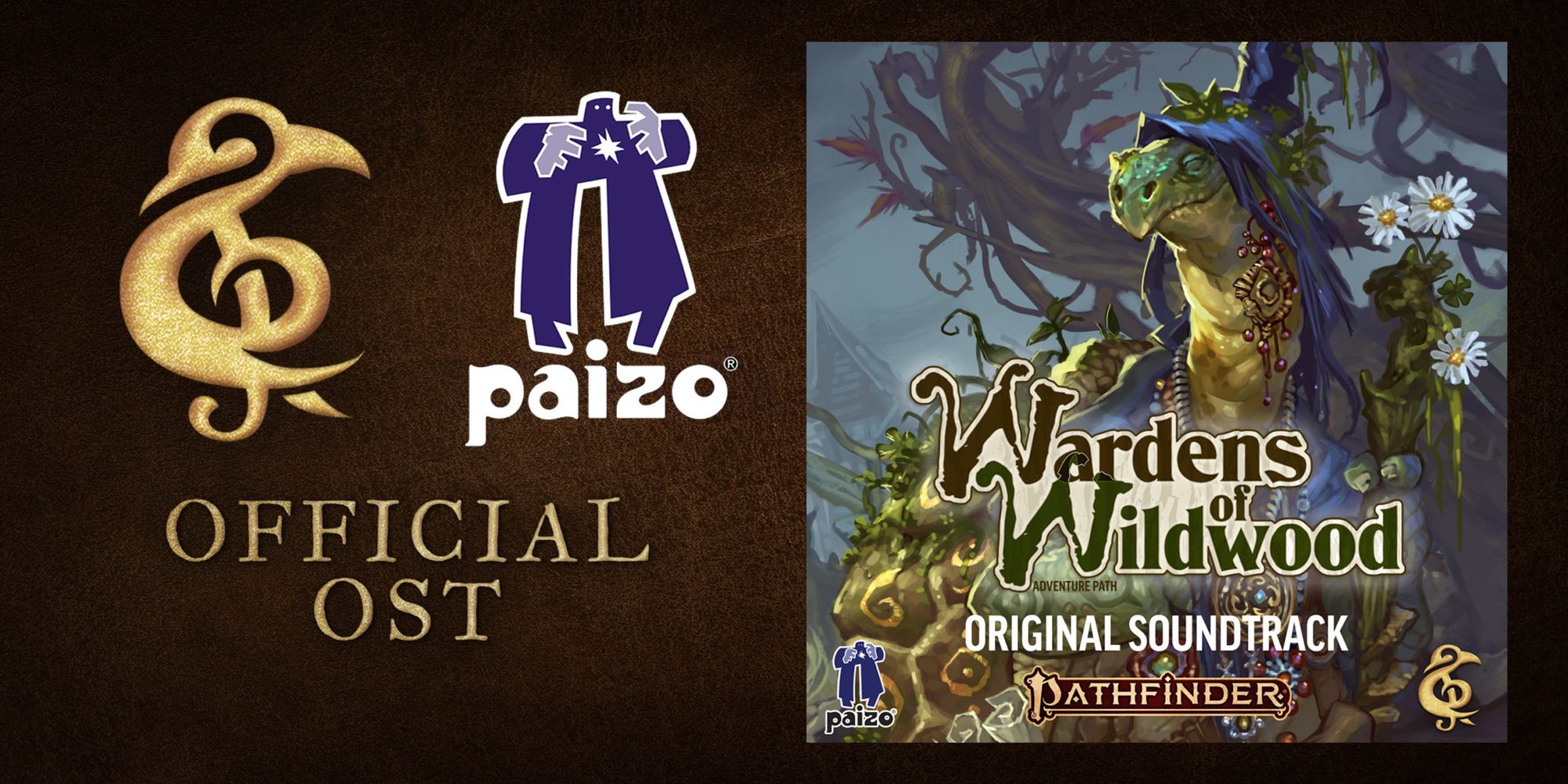
What’s one random fact about you?
Michael: I'm a philosophy nerd.
What motivated you to take the leap into the TTRPG industry?
Michael: Since I was like 10, I wanted to be my own boss.
I used to work as a project manager in Cybersecurity for the Swiss government. While it was interesting, I still had to go at someone else's pace, which is hard for me. In my free time, I accidentally made a very successful YouTube channel and thought I should invest myself in it. In January 2020, I left my job, and it has worked really well since then!
It was interesting to protect digital assets against the bad guys, but being able to make a living creating unusual audio layers to kill goblins sounded way more interesting, haha.
What does it look like, leading a dedicated audio label to TTRPG projects?
Michael: 20% audio composition, 80% boring administrative stuff.
I'm joking, but the audio creation side became secondary over the years. It's something I thoroughly enjoy, and I'm glad I can still do it. You'd be surprised how many of the creative minds who started a project in TTRPGs end up giving that creation job to others because of the sheer amount of promotion, admin, negotiation, and so on that have to be made constantly.
I'm blessed to be working with Filip Melvan, the main music composer behind MGS. He's a musical genius, and I never have to worry about the quality and originality of his work. I can focus on finding great projects to work on, and put the oil in that big machine. As I said though, the ambiences and SFX are made by me. We also have the guys behind Lyre RPG Music to compose music for us. We also just recruited another composer to the team, but it's all new, so stay tuned.
Also, from the audio label perspective, it's completely different from other music labels. We do not produce artists to play in front of a crowd. The business and management sides are entirely different, almost opposite. We choose to put the label forward, as the name is very well known. Like a stamp of quality. It's unique, and it works well!
How did the collaboration between you, Filip Melvan, and Lyre RPG Music come together to form this collective? As a collaborative studio with multiple talented creators, how do you coordinate your efforts and maintain a cohesive vision for the studio?
Michael: As a creative myself, I think I know what's enjoyed by other creatives: freedom. I literally never impose anything on them, except when they accept a client request. Then the client is king, obviously.
As for the rest, my job is to find trends and suggest ideas. I also make sure nothing administrative impairs their creativity. I'm an organizational freak (maybe my Swiss side). I love it when things are tidy and clean. It's something my colleagues enjoy, as creatives tend to be more chaotic. So in short, it's basically: "Compose whatever you want, I'll do my best to organize and generate value out of it."
Filip told me he's living his dream job and that's really heartwarming. I wouldn't change that for anything.
As for the cohesive vision, I think I have a simple rule. I only work with smart people. Believe it or not, it just works. It helps that we aren't 20 as well. If we were that many, we would maybe need a quality controller, or Filip, officially our Music Director, would have to dedicate more time to administrating that side.
However, when I hire a new composer, it means we love his style. So somehow, the cohesive vision is to each have a unique, but highly qualitative touch to our creations.
Do you draw inspiration from other forms of media, such as film, video games, or literature, when designing your soundscapes? Or, where does the inspiration come from in the work you do (your “muse”)?
Michael: For music, you'd have to ask the team.
For my ambiances and SFX, for a long time it was based on what I needed for my own campaigns. I play TTRPGs a lot (10 hours per week as a DM), and I used to just fill in the blanks. Now, with over 1600 ambiances, it's hard to find holes. I just wait to receive requests from our community and add them to my To-do list. It has several hundred entries waiting to be composed so I don't lack ideas thanks to them!
Now, it's mostly niche ambiances that wait to be made. We got you covered for anything else!
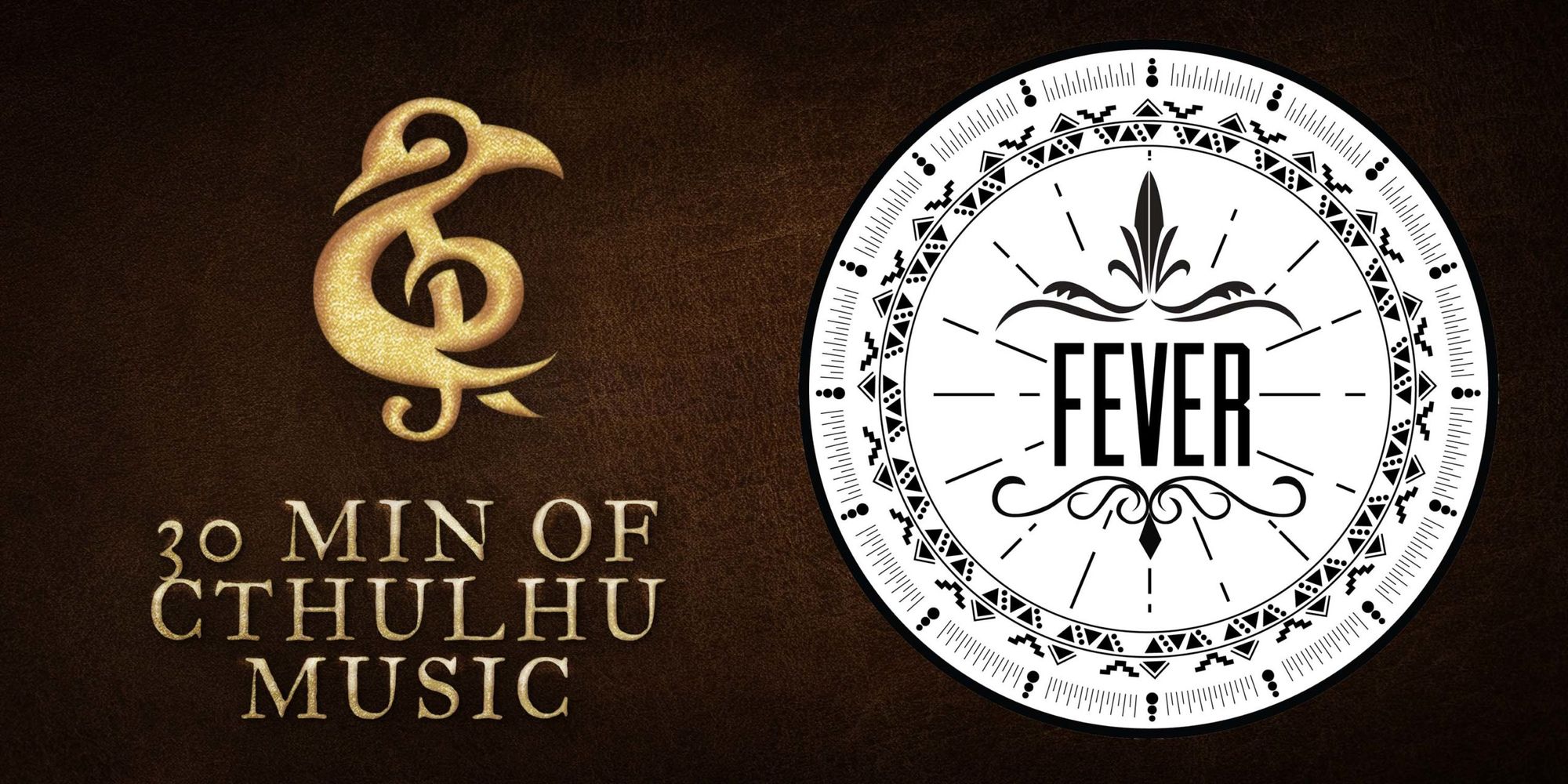
Your work has grown significantly over the years. How has your approach to sound design evolved since you first started, and where do you see it heading in the future?
Michael: That's a tough question.
TTRPG creations have become more and more professional over the years. If you listen to the trendy audio solutions from 5 years ago and what's produced now, it's very different. The quality skyrocketed, and in my opinion, these solutions didn't age well. I asked myself why and took some notes.
My approach has always been to be as respectful as possible to people's time. It means that I don't drop content that I'm not 100% convinced by. I also rework a lot of my older creations (that's not something you see on YouTube as we can't update older videos). But most of the audio we share on our tool Opus is updated. Reworking older content is something successful TTRPG creators advise against generally, as it doesn't help with the current flow of creation, and doesn't look all shiny and new on your pages. I absolutely don't care. I consider our albums/Patreon assets something that you'll keep forever, hopefully even give to your kids once they start DMing themselves. It's a life-long investment, like a beautiful Swiss watch. Once you buy it, you can have it revised forever for free. That's what I'm building.
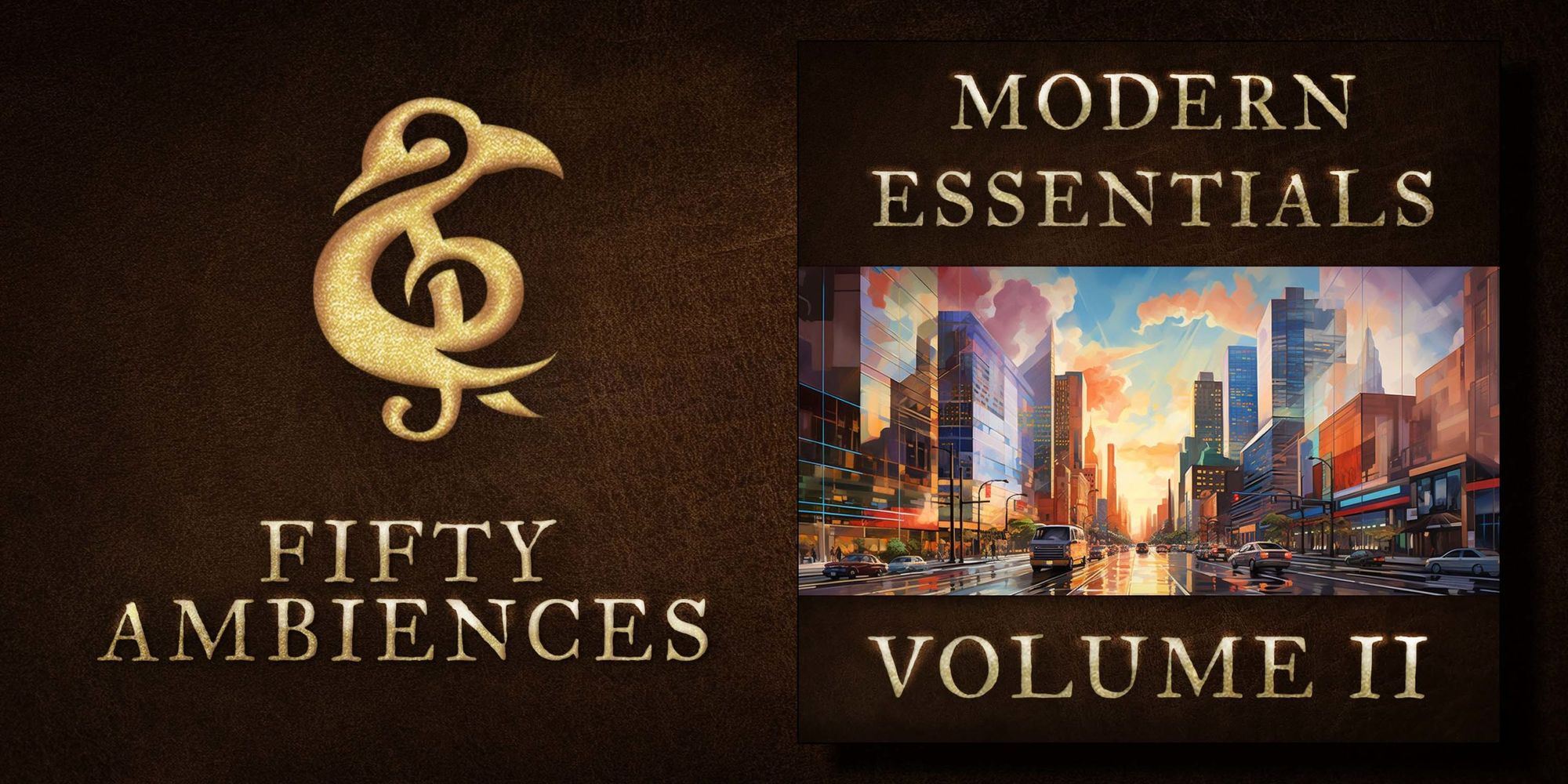
As for the future, I keep that focus on quality and uniqueness. For example, all the voices you hear in our ambiances are not real languages. I insist on that and I'm really proud of it. We can count on our community to send their incredible voices, to be used in our ambiences. You can do it too! We are the only ones to do that.
With over 1,400 ambiances, 1,100 songs, and thousands of SFX, your library is vast. What is your process for ensuring consistency and quality across so many different audio assets?
Michael: For the music, you can certainly hear differences between compositions from 5 years ago and now. That's because exporting music is intrinsically more creative than ambiances/SFX. You can give way different feelings based on your mixing/mastering choices. Also, it's more technical, and you never reach the top level, so you can always improve and learn.
For ambiances and SFX, my rule is to consider all the SFX and ambiances are heard by the very same character, with the same ears. There shouldn't be any creative take on these individually. I aim for objectivity in sound if that makes sense. I want it to sound true, not to convey emotions. That's the DM (and the music's) job.
You’ve achieved a lot in recent years. As you said, you won an ENNIES in 2021 for best digital accessories for TTRPGs. You’ve achieved over 160k subscribers on YouTube. And by now, your audio has been used in thousands of podcasts, videos, and more. How does this recognition feel? Motivating? Scary? And does this sort of prestige inform the kind of projects your label/business is willing to take on?
Michael: I can only speak on a personal level. Recognition feels good, but I'm not actively looking for it. Otherwise, I would have aimed for something else other than TTRPG audio. I'd do some face cam videos or something like that.
Anyway, it's not scary. It does feel good, but it's not a motivation per se. The motivation is to build good things that will last forever. The things we build and share matter, not us.
One thing that really feels good though, it's the personal messages and the people who tell their stories of how they used our audio in their games, especially when I meet these people at conventions and they recognize me. It's always unexpected (as we rarely show our faces), and these honest, unprepared, pure moments of sharing are among the best feelings I experienced. It's real, it's humane.
As for the projects we work on, we are in a situation where we can afford to select projects we love. We aren't dependent on commissions. For example, one of our current commissions is to compose the soundtrack for a personal TTRPG campaign. It's financially not interesting, but the person approached us with an authentic will and love for the audio, and the stories to weave with it, and we accepted.
Naturally, we now get requests to work on bigger projects. We have two video game projects and a few other things going on. We love working on OSTs for TTRPG Kickstarter campaigns, for example! We did two recently.
Speaking of community, your work reaches players and GMs all over the world, and you’ve built a strong community through platforms like Patreon. How has the community influenced or shaped the content you produce?
Michael: Our content is community-driven, if that makes sense. Sometimes, I build what I find fun, but ultimately it has to answer to a demand. Our audio isn't only meant to sound good, it has to be useful. It's not just art, it's a product as well.
A strong community gathered around us because we provided something useful. If we started doing random stuff, people would leave (and they would be right to do so). Right now, our communities keep growing fast so I think we are on the right track. *Crossing my fingers*
How do you design your soundscapes to achieve an immersive experience for players and GMs within an RPG session? How do you balance creating songs that are both subtle enough to sit in the background during gameplay, but also impactful enough to evoke strong feelings during key moments?
Michael: For ambiances, the answer lies in mixing. You have to leave some room for the human voice to travel correctly over it.
For music, it's the same + the composition must be homogeneous within a single track. If you got ups and downs, key changes all the time, and so on, it may sound awesome as a track, but it sucks for TTRPGs. As a composer in that situation, you have to refrain from your creativity to build something that fits the specific requirements of TTRPGs.
Many composers applied to join us, but I had to refuse many of them as they just "compose music". Not TTRPG music. It's a different job.
What tips would you give for GMs looking to use audio to enhance a game’s narrative, other than buying your music/ambiance?
Michael: Do it incrementally, take your time to learn your library. Start with simple elements (one song to start the session, one to do the final speech, if you do that). Put 2-3 ambiances for a whole session and only in places in which your players will stay for some time. Select a single cool SFX for a key moment (a car that explodes, the mine that collapses, etc.).
Many DMs complain about the complexity of using audio. I both agree and disagree. It's like accents. It's really hard to do good accents as a DM, even harder when you have to modulate them with emotions and such. Start small, and you'll end up using audio increasingly naturally, to the point you won't even notice changing the playlists and the ambiances at key points. It does marvels for immersion.
As pioneers in the TTRPG audio space, where do you see the future of audio heading in this industry? With continued advancement in audio technology, do you see any innovations on the horizon that could change how sound is used in TTRPGs?
Michael: Technology is becoming more and more present in TTRPGs, it's a secret for no one. Beyond audio itself, people are looking for a service mostly. That's why we are investing so much into our tool Opus.
We can't just be distributing thousands of tracks each year forever. The "marginal utility" of each track decreases the more you share, as you are aiming for more and more niche sounds. It's also becoming harder for users to find the exact one they need. With a tool like ours, built to do better than the old elephant in the room, it's an easy trick to grab the most out of a gigantic, ever-growing library, with its lightning-fast UI and unique features, as well as the FoundryVTT integration, etc.
Independent composers aren't doomed though! Not all composers should build their own tool, as it's too costly and risky. Our tool is meant to be a viable solution for all of them as they can apply to add their library to it (and get paid). Soon, we will offer users the opportunity to upload the audio they purchased anywhere else.
With such a diverse collection of ambiances and soundscapes, do you have a favorite genre or theme to work on, whether it’s the tranquil sounds of nature, eerie horror settings, or epic battle music?
Michael: Recently, I found myself a passion for spell SFX. I just finished composing 1 SFX for EACH D&D spell, there are over 600 of them! Now I'm doing the same for each D&D monster death and attack. Then I'll work on Pathfinder monsters, probably.
You said that you play TTRPGs a lot (10 hours per week as a DM). So what game systems do you play? And what is your favorite VTT to run on? What kind of improvements do you want to see in it?
Michael: Starfinder, War Within, and D&D 5e, mostly! I mostly play in person, my friends live 5 minutes away from my apartment.😀
When I have to play remotely for livestreams and such to which I'm invited, it's always Foundry VTT because of its modularity.
Do you have anything you want to say to the greater TTRPG/VTT community?
Michael: Thank you. I live my dreams thanks to you.
You’ve inspired many GMs to incorporate sound into their games. What advice would you give to aspiring creators looking to make their own TTRPG music apart from what you already said above? What tools or resources would you recommend to someone just starting out?
Michael: Ugh, the answer is really gloomy. I'd just say, keep that as a passion project. The demand/offer ratio is extremely in disfavor of audio. It's not mapmaking, module creation, or illustration. Making a living with music in TTRPGs is by far the hardest, as you are also in competition with the Skyrim OST, the Witcher OST, etc. Just compare the best TTRPG audio Patreon pages (ours and 1-2 others) and the biggest mapmaking pages, and you'll understand. I know incredibly talented composers who make less than 1000 views per month... in total.
If anyone needs me to tell them what tool they need to use, it's a bad omen already. The other bad news is that composing music is expensive. You need a very powerful computer, many libraries, a MIDI keyboard, and mixing and mastering tools. You also need to train yourself in both music composition and audio engineering (two different jobs with a lot of depth, you can't just wing it).
If you still want to try, you can find some tutorials on YouTube easily!
What are the long-term goals for Michael Ghelfi Studios? What are your plans as an RPG creator? And do you have any plans to expand beyond TTRPGs into other areas (except the video games you mentioned)?
Michael: Making sure our tool Opus becomes the ultimate tool to manage audio and note-taking for TTRPGs. We are in a very good dynamic so far, and our objective is not to have that monopolistic approach, but rather to build as many bridges as possible. It makes everything more interesting and better.
We are also trying to use more and more real performers to record for our tracks. It makes the music so much more lively. It's very unusual in TTRPG music. Naturally, we don't use AI at all in our audio. Never.
Besides that, we are focusing on what we do best: composing things that will last forever.
Thank you, Michael, once again for your willingness and time for this conversation.
Michael: Thank you for having me.
You can find links to Michael Ghelfi Studios' work by clicking on the images below:
Listen!



Downloads!


Useful resources & Info!
